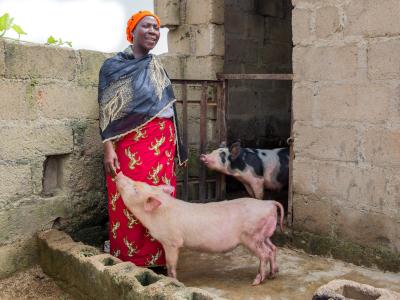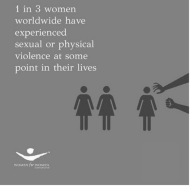During #16Days of Activism to End Gender Based Violence (GBV), it’s important to remember why the work we do is so vital and how much more needs to be done. Gender based violence is still one of the single greatest barriers to women’s empowerment and advancement around the world. Levels of violence against women are appalling: one in three women reports experiencing some form of physical, or sexualized violence.
At Women for Women International (WfWI), we support women both economically and socially through a 12-month empowerment training program which provides the building blocks for women to transform their lives. Women begin the program by learning about financial decision making. They also learn about health and wellness, gender equality, human rights and the importance of social networks and advocacy. While the curriculum includes information on the most common forms of GBV including rape and violence at home, we realized that we needed to enhance the curriculum to include more information on the different types of violence against women, its causes and effects, common myths about GBV, qualities of an abuser, and the cycle of violence.
Thanks to our program, women like Zarghuna from Afghanistan, find the strength from within to make better lives for themselves and their loved ones. Zarghuna was living in an abusive relationship but is now a successful entrepreneur thanks to WfWI’s program.
Zarghuna told us her story:
“I went to the hospital for my depression [after being severely abused]. The doctor told me, ‘You don’t need any medication. When you remember your past, it hurts you. So you need somewhere to go and sit with women, with different kinds of women—with lucky women and unlucky women, with poor women and rich women—so you can see how they are dealing with their problems and how they are dealing with the challenges that they face.’
One of my friends told me about Women for Women International and how it provided training for women. When I joined, I found myself in a group of 25 women. That’s when I learned that I wasn’t alone in my suffering. There are other women, who have the same pain and the same hardships. To realize that was amazing. I went to the organization for a year until I graduated. After that I succeeded in finding a job in embroidery and handicraft. And I was always thinking about how I could build my own business. Eventually I decided to take a micro-loan of $500. From there I started selling my embroidered products and my business grew quickly. I am so proud to be able to tell you that I have $30,000 in the bank. I only wish to see peace in my country and expand my business more and more. “
Because we work in conflict affected countries, women in our program often experience heightened levels of violence as a result of war and instability. When they join our program, it may be the first time they are offered a safe space to discuss their experiences. We must ensure that we treat survivors with sensitivity, respect and confidentially. While we don’t offer direct services ourselves, we do maintain strong relationships with other organizations that we often refer women to who assist survivors of violence including NGOs and government agencies who offer psychosocial support, health services, counseling, and legal aid.
Rather than providing direct services, our work is focused on preventing violence from occurring in the first place. Through education and training programs, our work is addressing the root causes of violence, recognizing women’s low social status, the imbalance of power, and rigid gender roles. Primary prevention for violence against women involves creating an environment that supports women’s rights, a culture in the community which promotes non-violence, relationships based on equity, and individuals who take a personal and public stand against abuse. Societal change requires building a critical mass of individuals and institutions who believe in addressing the issue, especially institutions of power and male members and leaders of the community.
WfWI excels at providing training and resources to marginalized women that enables them to reach their goals, while also engaging men to support the efforts of the women in their lives. In order to have community buy-in and support, we must also be deeply embedded in the communities we serve, which is critical to stopping GBV in its tracks.
As we reflect on #16Days of Activism and think about plans for 2018, GBV prevention will remain a critical focus of our efforts. We will work with our country offices to improve the delivery and content of our training program and the capacity of our staff to help survivors, strengthen referral mechanisms with local partners, and improve advocacy efforts that give the graduates of our program the tools to advocate for community and national-level changes to address and prevent GBV.
We can all commit to preventing gender based violence and our program is doing the work necessary to create lasting change.

